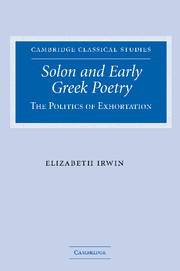Book contents
- Frontmatter
- Contents
- Acknowledgements
- List of abbreviations and editions
- Introduction
- PART I THE POLITICS OF EXHORTATION
- Introduction
- 1 Understanding the political in martial exhortation elegy
- 2 Synthesising content and context
- 3 Contextualising the city: archaic verse inscriptions and the ‘rise’ of the polis
- PART II POLITICAL POETICS: SOLON'S EUNOMIA
- PART III POETRY AND POLITICAL CULTURE
- Conclusion
- Appendix I Who were Tyrtaeus' gymnetes?
- Appendix II λυκάβαντος: when the wolf comes?
- Bibliography
- General index
- Index locorum
Introduction
Published online by Cambridge University Press: 05 November 2009
- Frontmatter
- Contents
- Acknowledgements
- List of abbreviations and editions
- Introduction
- PART I THE POLITICS OF EXHORTATION
- Introduction
- 1 Understanding the political in martial exhortation elegy
- 2 Synthesising content and context
- 3 Contextualising the city: archaic verse inscriptions and the ‘rise’ of the polis
- PART II POLITICAL POETICS: SOLON'S EUNOMIA
- PART III POETRY AND POLITICAL CULTURE
- Conclusion
- Appendix I Who were Tyrtaeus' gymnetes?
- Appendix II λυκάβαντος: when the wolf comes?
- Bibliography
- General index
- Index locorum
Summary
Hector exhorts his fellow warriors to battle with the words, ὃς δϵ ́ κϵν ὑμϵ ́ων | βλήμϵνος ἠϵ ́ τυπϵὶς θάνατον καὶ πότμον ϵ ᾽πίσπῃ | τϵθνάτω· οὔ οἱ ἀϵικϵ ́ς ἀμυνομϵ ́νῳ πϵρὶ πάτρης | τϵθνάμϵν (‘And whoever hit by a missile or struck by a sword finds his death and fated end, let him die. It is not unseemly for one to die protecting the land of his fathers’, Il. 15.494–7). A generation later than the Homeric epic (according to traditional dating) a genre of exhortation poetry thrived in archaic Greece; it is epitomised by the poet Tyrtaeus' simple formulation, τϵθνάμϵναι γὰρ καλὸν ϵ ̓νὶ προμάχοισι πϵσόντα | ἄνδρ' ἀγαθὸν πϵρὶ ¸ πατρίδι μαρνάμϵνον (‘For it is a fine thing for a man having fallen nobly amid the fore-fighters to die, fighting on behalf of the fatherland’, 10.1–2). For both literary critics and historians these and similar passages function as ‘artefacts’ conveying poetic representations of political notions. The evident parallels between the sentiments expressed in these two distinct genres of poetry have yielded numerous discussions of the relationship between them, and of their connection to the historical and political settings in which they took shape. Employing a strictly philological approach, the most influential scholarship of this century has focused on detecting differences in order to create evolutionary models of the development of many political concepts including ‘patriotism’ and obligation to one's city.
- Type
- Chapter
- Information
- Solon and Early Greek PoetryThe Politics of Exhortation, pp. 17 - 18Publisher: Cambridge University PressPrint publication year: 2005



